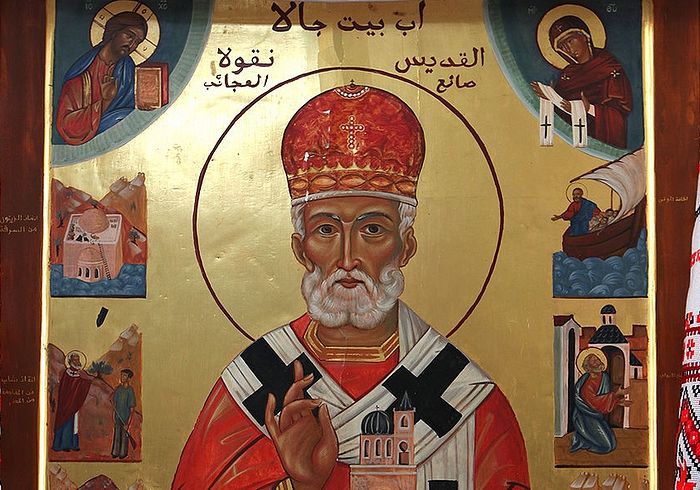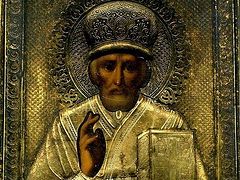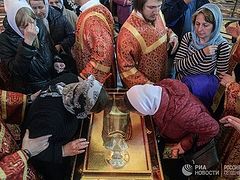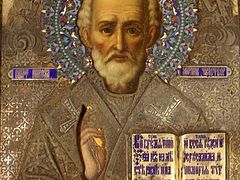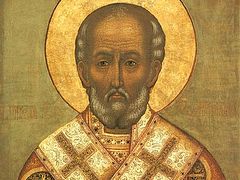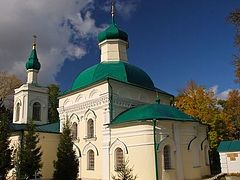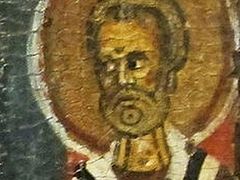In the Name of the Father and of the Son and of the Holy Spirit.
Some time ago I remember overhearing a child ask her mother: 'Mummy, why does Father Christmas have a beard? And why does he wear such funny clothes?' Her mother could give no adequate answer, quite simply because she was not an Orthodox Christian. All Orthodox should know the answer to the child's questions. Father Christmas, or Santa Claus, has a beard and wears such unusual clothes because he is the folklore version of an Orthodox bishop - St Nicholas. Who was St Nicholas?
Born at the end of the third century, in about 280, Nicholas was a very devout young man who, still quite young, became a Bishop and then the Archbishop of the then great city of Myra, which is in the province of Lycia in Asia Minor, which is now called Turkey. There he was renowned for his charitable deeds. There he set up orphanages, hospitals, hostels for the mentally ill, fed the starving in famine, and set up a drainage system so that his people would not die from the diseases incurred by poor hygiene. There he freed captives unjustly imprisoned, saved sailors in stormy seas, redeemed young girls who were bound for child prostitution. In everything he did, he wanted to show that our destiny is not to live as animals, but as the children of God. This is why, as one of the 318 Fathers present at the First Universal Church Council which took place in the year 325 in Nicea, he could not support the blasphemies of Arius.
This Arius was a philosopher, as we would say today, 'a clever dick' and stood up at that Council and said that Christ is not the Son of God. Like all who make the wrong choices, that is 'heretics' in the language of the Church, in talking about the Person of Christ, Arius talked of himself. For like every single heretic in Church History, Arius replaced the understanding of God, theology, with the understanding of his own self, psychology. Not being able to accept God through Faith, they replace the transcendent Revelation of God, the Reality beyond their tiny minds, with the fruit of their own fertile imaginations and make God into sinful individuals like themselves. Arius indeed was not the Son of God. However, if we were to believe his words that Christ is not the Son of God, then of course Orthodox Christianity would no longer be the one, unique soul-saving Faith, but just another vain philosophy, a mere religion.
So it was that when this Arius blasphemed at the First Council, St Nicholas stood up and slapped him across the face. The other Fathers were horrified by St Nicholas' violent action, defrocked him and sent him away. St Nicholas did not justify himself by saying that he was trying to silence the demonic blasphemies of Arius, by saying that he was trying to bring this arrogant man to his senses, by saying that if Arius were right, then mankind was condemned to live as animals. Instead he accepted this punishment with humility. However, many of the Fathers saw around St Nicholas a vision of Christ and his Most Holy Mother returning to the saint his episcopal vestments. This was a divine vindication of the action of the saint and indeed he was quickly reinstalled as Archbishop of Myra.
If we were to read the life of St Nicholas up until his repose, we would find that it runs to many, many pages. But if we were to read his life since his blessed repose, we would find that it runs to many, many books. His life since his death is much longer than his life before his death. For he is one of those many saints who has continued to work miracles among all peoples and among all generations up until the present age.
True, today the once great city of Myra is no more. In what is now a Muslim country there stand only the ruins of the great Cathedral of St Nicholas and the ruins of the buildings he had raised up. But St Nicholas is still venerated there, including by Muslims. Indeed he is venerated all over the world, by Orthodox and Non-Orthodox alike. Here in Felixstowe, the chapel at the ferry is dedicated to him and looking out across the haven to the port of Harwich there is the huge spire of St Nicholas' church, for he is ever the protector of seafarers.
Of St Nicholas' latest miracles we would quote only one, which came to our attention from a sure source only recently. It was a few years ago, in the 1980's, that a Russian nuclear submarine was in trouble in the Pacific Ocean. Its engine had stopped and refused to restart. Even in those Soviet times, however, one of the young sailors remembered that his grandmother had told him that St Nicholas always protects sailors. And, despite everything around him, he remembered to pray to St Nicholas at that moment. And through his prayers the engine started up again, over a hundred sailors were saved and the world preserved from untold pollution. St Nicholas is among us still today, here and now, preserving all who pray to him from danger and evil.
Finally, there is one question about St Nicholas which we must answer. Why does everybody love St Nicholas? Why is he so popular? Why do Muslims venerate him? Why do even Protestants dedicate chapels to him? Why do Catholics revere him and guard his relics in Bari in Italy? The answer is simple:
Everybody loves St Nicholas, because St Nicholas loves everybody.
Holy Father Nicholas, pray to God for us!

